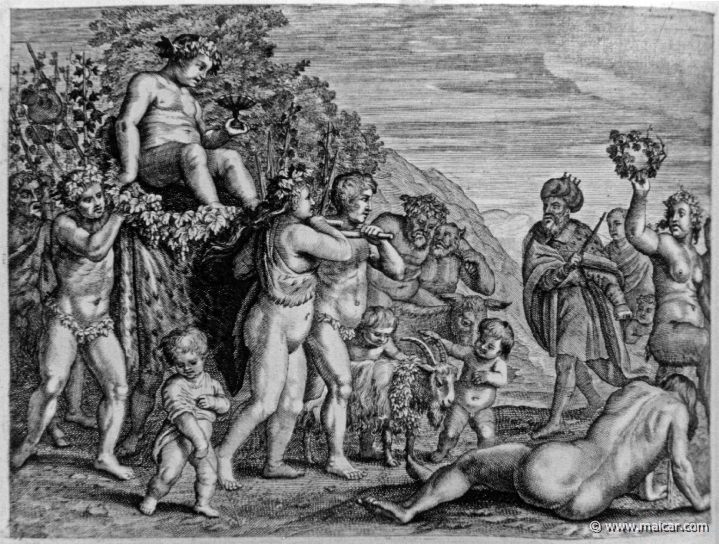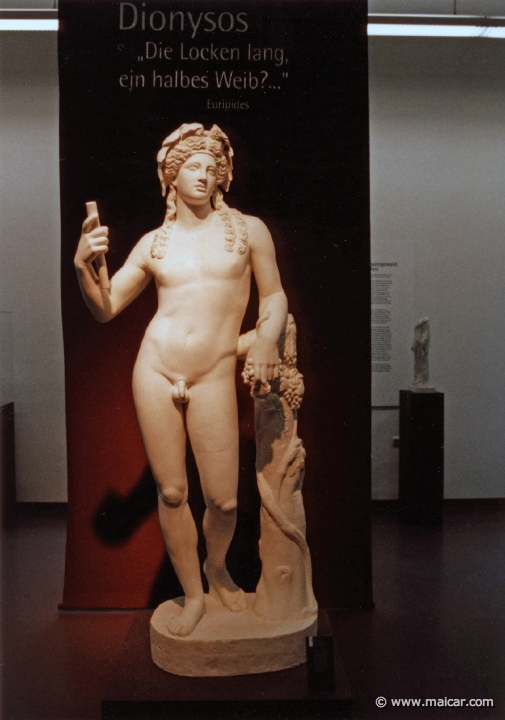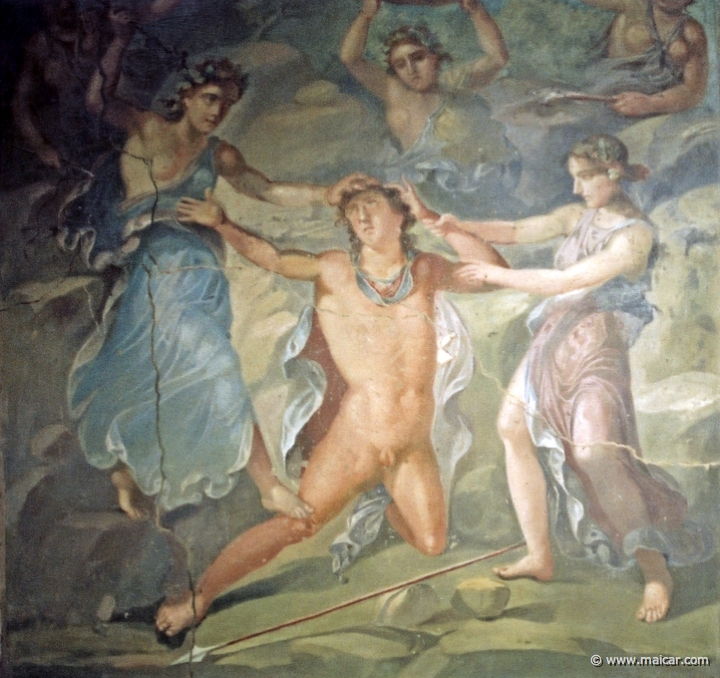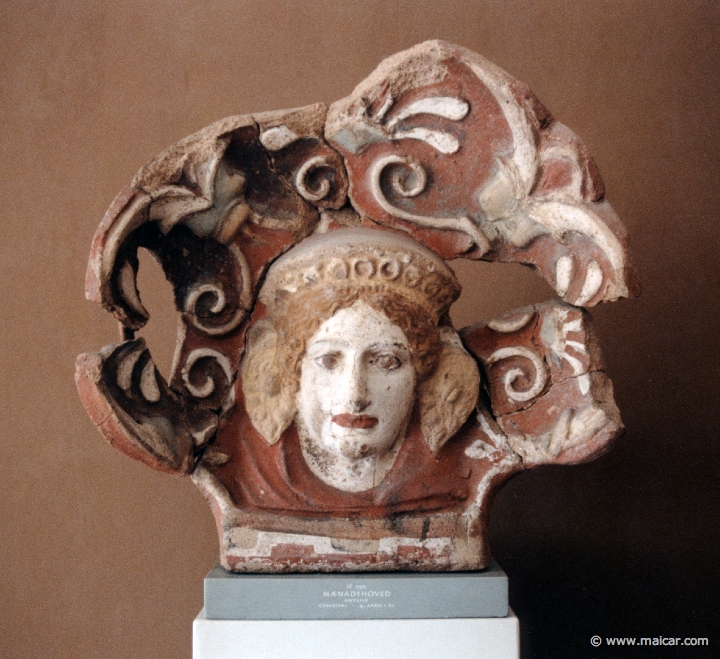|

|
King Pentheus 1 comes in person to stop Dionysus 2. 2629: Pentheus and Dionysus. Drawing from the 17C.
|
|
|
"Blessed is he who, being fortunate and knowing the rites of the gods, keeps his life pure and has his soul initiated into the Bacchic revels, dancing in inspired frenzy over the mountains with holy purifications, and who, revering the mysteries of great mother Cybele, brandishing the thyrsos, garlanded with ivy, serves Dionysus." (Euripides, Bacchanals 73).
"Will anyone say that I do not respect Old Age, being about to dance with my head covered in ivy? No, for the god has made no distinction as to whether it is right for men young or old to dance, but wishes to have common honors from all and to be extolled, setting no one apart." (Tiresias to Cadmus. Euripides, Bacchanals 205).
"One surpass another in different ways, in wealth or power. There are innumerable hopes to innumerable men, and some result in wealth to mortals, while others fail. But I call him blessed whose life is happy day to day." (Euripides, Bacchanals 908).
|
|
Pentheus 1 is the king of Thebes who denied the
divinity of Dionysus 2, and was torn limb from limb by the MAENADS.
King Pentheus 1
King Pentheus 1 came to the throne of Thebes after Cadmus, the founder of the city. He was the son of Echion 2, who is one of the so called SPARTI, men
born from the teeth of a dragon of Ares. The SPARTI were regarded, up
to historical times, as an influential clan in the
city of Thebes. Pentheus 1's mother was Agave 2, one of the daughters of Cadmus and Harmonia 1. On account of his noble birth, Pentheus 1 was a powerful king, but also because of this he was an arrogant man of insolent and impious character, and letting himself be led by such unfortunate features, he came to be punished by the the god of the vine Dionysus 2.
Previous unwise deeds of Pentheus 1
According to some, it was unwise Pentheus 1 who opened the gates of Thebes to the blood-stained brothers Nycteus 2 and Lycus 5, enrolling them as citizens, and allowing them to become influential, despite the fact that they had already killed a man, namely King Phlegyas 1, who reigned somewhere in Boeotia and was the grandfather of Asclepius. These two
jewels, who in reality were outsiders since they
came from the island of Euboea, usurped in time the
government of Thebes, involved the city in foreign wars, and committed other crimes, as was the abduction, imprisonment, and torture by Lycus 5 and his cruel wife Dirce of Antiope 3, mother of Amphion 1 and Zethus. That was Pentheus 1's gift to his city. But the willingness with which he wished to regale Thebes with these
ambitious brothers, he did not show when the god of
the vine came to the city, and believing Dionysus 2 to be a
mortal man and not a god, he opposed him and thus
met his death.
Dionysus 2 in Thebes
Dionysus 2 came to Thebes after a long
journey in Asian countries in the form of a mortal
man, wishing to introduce his rites in the city
where his mother Semele had died stricken by thunder because of Hera's wrath. And he also
chose Thebes, as the
first city in Hellas to know the vine and its rites
because Semele's sisters,
out of jealousy, denied that he was the son of Zeus. For they declared
that Semele had consorted
with a mortal man, and that Cadmus, in order to save
his daughter's reputation, invented the story of Zeus' love for her, adding
that because of that unholy lie Zeus had killed her. So, in order to punish the intriguers and show
them what it meant not to be initiated in the
Bacchic rites, Dionysus 2 came to the city, and made the Theban women
leave their houses in frenzy, having them dwell in
the mountains, out of their wits, and wearing the
outfits of his mysteries. And he decided that this
mad state of affairs should proceed until they
acknowledged that Semele had borne a son to Zeus.
The obstinacy of Pentheus 1
However, no matter what happened, Pentheus 1 fought against the god, driving him away from all sacrifices, and making no mention of him in his prayers. And because of the obstinacy of the king, Thebes refused to crown itself with ivy branches, to twine the thyrsoi, and to wear fawn-skins. The city being in a state of disorder, Pentheus 1 decided to stop the ill-working revelry by hunting those feasting in the mountains, and having them bound in iron-fetters. And Dionysus 2, whom he
saw glancing much in the manner of Aphrodite and spending
day and night with young girls while he allured
them with his mysteries, he called a sorcerer and a
conjuror came from abroad. And yet the seer Tiresias had warned him
long before, for he told him:
"Unless you
worship Dionysus as is his due, you will be torn into a thousand pieces and scattered everywhere …" (Tiresias to Pentheus 1. Ovid, Metamorphoses 3.520).
Two ways to kill a man
|

|
Dionysus 2: too sensual, too effeminate, too foreign to be a god, according to Pentheus 1. 0329: Bacchus Richelieu. Roman copy from Greek original from 320 BC. Archaeologie Staatssamlung.
|
|
In particular, Pentheus 1 was disgusted with the way Dionysus 2 used to
shake his hair, and he considered to put a remedy
to that kind of provocative insolence by cutting
his head off. At other times, the king thought that Dionysus 2 was rather
worthy of a terrible death by hanging, since
claiming to be the son of Zeus was a formidable crime, and he also thought that he Pentheus 1 was the one to punish impiety, as if the gods could not avenge themselves if and when they wish. But the method of execution was not the only concern of Pentheus 1:
"… where women have the delight of the grape-cluster at a feast, I say that none of their rites is healthy any longer." (Pentheus 1 to Tiresias. Euripides, Bacchanals 261).
Tiresias' lecture
The seer Tiresias attempted to persuade the king:
"This new god,
whom you ridicule, I am unable to express how great
he will be throughout Hellas. For two things, young
man, are first among men: the goddess Demeter …—she nourishes mortals with dry food; but he who came afterwards … discovered a match to it, the liquid drink of the grape, and introduced it to mortals. It releases wretched mortals from grief, whenever they are filled with the stream of the vine, and gives them sleep, a means of forgetting their daily troubles, nor is there another cure for hardships." (Tiresias to Pentheus 1. Euripides, Bacchanals 275).
Tiresias also tried, being a seer, to show the king that revelry and madness may have in them prophetic skill. He advised Pentheus 1 to celebrate the rites of Dionysus 2, for, he
said, the power that government may have over men
is weaker than the power of the god when he enters
the body in full force. And as to the corruption of
women, Tiresias added:
"Dionysus will not compel women to be modest
in regard to Aphrodite, but in nature, where modesty
always dwells, you must look for that. For she who
is modest will not be corrupted in Bacchic
revelry." (Tiresias to Pentheus 1. Euripides, Bacchanals 315).
A third way to kill a man
Tiresias was
supported by old Cadmus, but Pentheus 1 was not likely to be persuaded, for when power goes along with arrogance it sees a foe in whatever or whoever escapes its limitless thirst for control. And since Pentheus 1 could not see in Dionysus 2 but an
effeminate stranger corrupting the women and
polluting the Theban beds, he just thought that it
was time to invent yet a third way of executing the
stranger, and so he thought that stoning him would
be appropriate.
Crazy thoughts
But, as it has been said, who can think of
cutting heads, hanging, or stoning to death, but an
insolent maniac? For this was not a god of
destruction and lawlessness, in whose banquets the
guests wore garlands, and joined in dances,
laughing with the music of the flute. This was a
god who brought relief from all cares, for life is
short; and by permanently pursuing great things,
there are many who do not achieve what is present,
and they themselves would not deem many other
things better than having their hearts soothed by
both Aphrodite and Dionysus 2. For these
have led many to the presence of the MUSES and the CHARITES, and have
calmed their Desire. Dionysus 2 does not
know of ugly strife, but instead is a lover of Peace, who nourishes
youth and gives riches. That is why Dionysus 2 abhors only
those, who unable to keep away from the over-wise,
do not care about leading a happy life by day and
by night.
Guards against Garlands
Pentheus 1 was not a reasonable man, but instead an arrogant ruler with confused ideas about law and order. So he sent guards in order to release the garlands to the winds, and to carry bound in the chains of the public prison those who wore them. And that is how Dionysus 2 himself, looking as a Bacchant, was taken chained to the king, who neither appreciated his long hair scattered over his cheeks, nor his soft skin, nor his whole appearance, which Pentheus 1 judged to be "hunting after Aphrodite."
|

|
The MAENADS killing Pentheus 1. 8829: Pentheus' død. Originalen i fresko findes i Vettiernes hus, Pompeii. Romersk ca. 70 e. Kr. (Royal Cast Collection, Copenhagen).
|
|
Marvels in the mountain
Pentheus 1, despite all warnings, imprisoned Dionysus 2, but he, being a god, set himself free when he wished, and having put Pentheus 1's home on fire, knocked it to the ground. In the meantime, a messenger reported to the king that marvels were taking place in Mount Cithaeron where the Theban women had been dancing. For, to begin with, they were not drunk with the goblet, or entranced by the flute, and there was no, as the king used to call it to all who would listen, "hunting of Aphrodite." But instead there were women, old and young, who were a marvel of orderliness to see, giving milk to gazelles and wolf-pups, for among them there were several, who having abandoned their new-born children, had their breasts swollen. And they put on garlands of ivy and oak, and in the place where one of them stroke the ground with her thyrsos, which is a staff that is crowned with ivy, there came forth a stream of wine. And when they
scratched the earth with their fingers, they
obtained streams of milk, and honey dripped from
the thyrsoi. This is what happened when the MAENADS were left in
peace. But when they were ambushed and persecuted
by the king's men, they could tear apart whoever
came in their way, man or animal. For when the
guards escaped their fury, the women sprang on the
heifers, and rent asunder the calves, while others
tore apart cows and stumbled fierce bulls to the
ground. And in the same way, resembling soldiers,
they could fall upon towns, turning everything
upside down, and snatching the children from their
homes. And they could also carry heavy objects on
their shoulders without holding them with bounds,
and they were seen carrying fire on their locks
without being burned. And when those who were thus
plundered by the MAENADS opposed them with their arms, they were unable to
wound them, for no blood came forth when they were
touched by weapons, whereas the MAENADS continuously
wounded their enemies by hurling the thyrsoi at
them.
Exhortation to Pentheus 1
So seeing how unarmed women were defeating armed men, some began to understand that such things cannot be achieved without the help of a god, and that is why they exhorted Pentheus 1 to do as follows:
"Receive this
god then, whoever he is, into this city, master.
For he is great in other respects, and they say
this too of him, as I hear, that he gives to
mortals the vine that puts an end to grief. Without wine there is no longer Aphrodite or any other pleasant thing for
men." (Messenger to Pentheus 1. Euripides, Bacchanals 770).
Helmets better than wreaths
But why should the king let himself be humiliated by weak women, when he had shield-bearers,riders, horses, and the power to deploy them and stage a devastating assault? This original thought occurred in the mind of Pentheus 1, and he decided to order such an attack in an attempt to make a great, and as some would say "historic" slaughter of the women. For clashing cymbals, tricks of magic, hysterical cries, drunkenness, and vulgarity, he thought, are nothing compared to drawn swords, trumpets, horsemen, and lines of spears. And all the same, helmets are a better shelter than garlands or wreaths.
Hopes to watch what will disgust him
But before he passed into action, he was
persuaded by Dionysus 2, who was disguised as a priest of his own
rites, to go first and spy the MAENADS in the woods,
being advised by the god to go dressed as a woman,
for otherwise they would kill him. And when he
came, hiding as spies do and (strange enough)
hoping to watch what would disgust him, that is,
the shameful acts of the MAENADS, Dionysus 2 placed him
on the top of a pine, thus exposing him, and
ordered the women to punish him.
Torn limb by limb
|

|
5107: Head of Maenad, Cerveteri 4C BC. Ny Carlsberg Glyptotek, Copenhagen.
|
|
And Pentheus 1's own mother Agave 2, for she and her sisters, having lost their minds, were among the MAENADS, was the
first to fall upon him, having dragged him down.
And seizing one of his arms at the elbow and
propping her foot against her son's side, she tore
out his shoulder, for that is the kind of strength
that the god bestows on his followers. Having torn
him limb from limb, one of the MAENADS bore one arm, another a foot, and his ribs were stripped bare from their tearings. When Pentheus 1 was thus turned into pieces, they started playing a game of catch with his flesh, while Agave 2 fixed the king's head on the end of a thyrsos, carrying it through Mount Cithaeron and believing she had hunted a savage lion. It was not until later, when she recovered her mind, that she learned what she had done to her son.
Daughters of Cadmus also punished
This is how Dionysus 2 punished both Pentheus 1, his mother, and her sisters, letting them destroy each other by means of their own violence, and joining all of them in one ruin for having failed to revere him as a god.
Fateful Mount Cithaeron
These events occurred in Cithaeron, the mountain
between Boeotia and Attica, called after King
Cithaeron of the Plataeans, a fateful mountain for
the Thebans, for there Actaeon lost his life,
the male NIOBIDS were
slaughtered by Apollo,
the child Oedipus was
exposed by his parents, and the ultimatum of the SEVEN AGAINST
THEBES was issued. After Pentheus 1's death, Cadmus, along with his wife Harmonia 1 and their daughter Agave 2, left Thebes, and having come to Illyria, he took the throne from King Lycotherses, whom Agave 2 killed, and reigned there until the end of his life. The death of Agave 2 has not been reported.
Another Pentheus
Pentheus 2 was also a Theban. He was among those who laid an ambush for Tydeus 2, the ambassador
of the SEVEN AGAINST
THEBES, when he returned from the city. Pentheus 2 was killed by Tydeus 2 on the same
occasion.
|